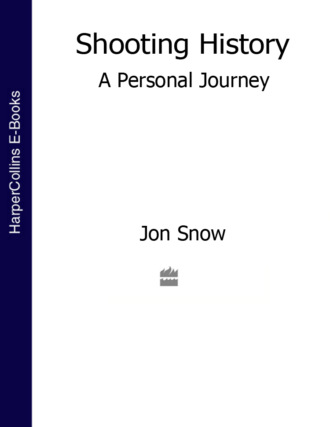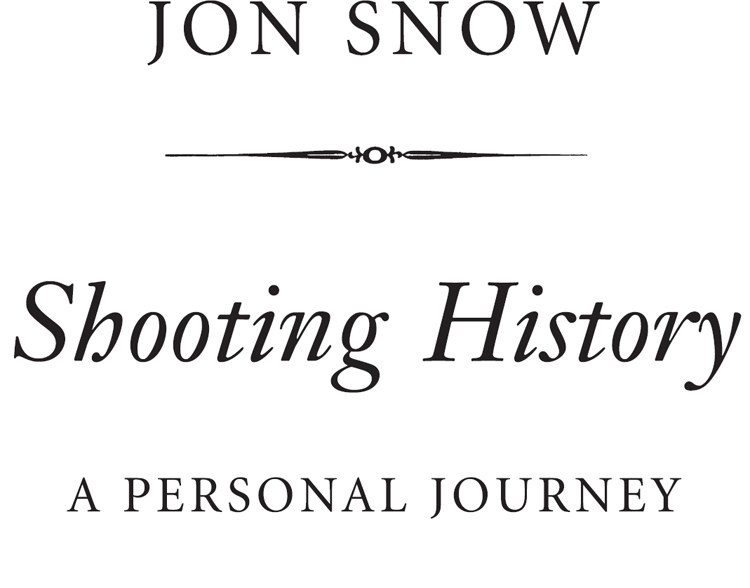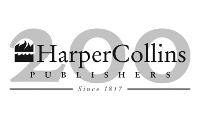
Полная версия
Shooting History: A Personal Journey




COPYRIGHT
William Collins
An imprint of HarperCollinsPublishers Ltd.
1 London Bridge Street
London SE1 9GF
www.harpercollins.co.uk
This edition published by Harper Perennial 2005
First published by HarperCollinsPublishers 2004
Copyright © Jon Snow 2004
PS section copyright © Louise Tucker 2005, except ‘Signposting History’ by Jon Snow
© Jon Snow 2005
PS™ is a trademark of HarperCollinsPublishers Ltd
Jon Snow asserts the moral right to be identified as the author of this work
A catalogue record for this book is available from the British Library
Lines from ‘On the Pulse of Morning’ by Maya Angelou reproduced by permission of Time Warner Book Group UK
All rights reserved under International and Pan-American Copyright Conventions. By payment of the required fees, you have been granted the nonexclusive, nontransferable right to access and read the text of this ebook on-screen. No part of this text may be reproduced, transmitted, downloaded, decompiled, reverse-engineered, or stored in or introduced into any information storage and retrieval system, in any form or by any means, whether electronic or mechanical, now known or hereafter invented, without the express written permission of HarperCollins ebooks
HarperCollinsPublishers has made every reasonable effort to ensure that any picture content and written content in this ebook has been included or removed in accordance with the contractual and technological constraints in operation at the time of publication
Source ISBN: 9780007171859
Ebook Edition © MAY 2017 ISBN: 9780008258047
Version: 2017-05-04
PRAISE FOR SHOOTING HISTORY
From the reviews of Shooting History:
‘Snow is the closest we have to a modern-day George Orwell … A vivid, accurate, honest guide to the key world events from 1975’
Independent
‘Pacy, candid and anecdote-laden, Snow’s account of a childhood spent in awe of his father … is a delight’
Daily Mail
‘Shooting History is among my favourite memoirs this year. Snow is a thinker and a generous writer who has done incredible things and has views on them’
MATTHEW PARRIS, The Times, Books of the Year
‘Snow charts his own growth with self-deprecation and a lightness of touch … A fascinating insight into a world in flux’
Time Out
‘Will inspire anyone who wants to know what television is like at the uncomfortable end of the camera when the bullets are flying’
Guardian
‘[Snow is a] witty, mildly eccentric and utterly engaging writer … He cleverly uses his own personal experiences and insights gained while being present at some of the major events in modern world history to argue a particular point … His anecdotes on the likes of Margaret Thatcher, Ronald Reagan, Idi Amin are spot on’
Birmingham Post
‘Opinionated, eloquent … As one man’s take on the history of the past 30 years this is an impressive piece of work. Snow is good at teasing out the often terrible ironies of our times … A well-written, engrossing and surprisingly passionate piece of work’
Sunday Herald
‘Hugely entertaining … and makes you think’
Manchester Evening News
‘Fascinating … this book puts history into startling clarity’
Irish Examiner
DEDICATION
To Madeleine, Leila and Freya
CONTENTS
Cover
Title Page
Copyright
Praise
Dedication
List of Illustrations
Prologue
1. Home Thoughts
2. Africa, Revolution and Despair
3. Of Drugs and Spooks
4. Tea with the Tyrant
5. First Brick Out of the Wall
6. Of Oil, Islam and Moscow
7. Uncle Sam’s Backyard
8. Potomac Fever
9. Talking with the Enemy
10. The Whole Lot Comes Down
11. Hey, We Never Expected to Win!
12. Shooting at the Messenger and Coming Full Circle
Picture Section
Index
Acknowledgements
P.S. Insights, Interviews & More …
About the author
About the book
Read on
About the Publisher
ILLUSTRATIONS
(Photographs are from the author’s collection)
General Tom, my twice-knighted grandfather, who hung above the mantel and seemed to have inspected every boiled egg I ever ate.
War wedding. My father and mother met and married in a matter of weeks.
My father’s Hudson Terraplane Eight configured as a wartime fire-tender.
The damage caused by a Second World War bomb on the lawns of Charterhouse School; my father’s one moment of ‘action’.
A sunny Sussex childhood. Growing up in the aftermath of war.
No particular talent. Following childhood encounters with Harold Macmillan, my earliest ambition was to be a Tory MP.
My father with Macmillan at Ardingly. ‘Do you know what a Prime Minister is?’ he asked me. ‘Are you married to the Queen?’ I responded.
With Tom and Nick in the Terraplane; a happy contrast to the dining-table warfare.
The Queen visiting Ardingly. My mother had been to Harrods to buy a pair of Crown Derby cups and saucers from which the royal lips could sip their afternoon tea.
As a chorister at Winchester Cathedral in 1958.
My father, every inch a Bishop – eight feet tall in his mitre.
Back from Uganda. VSO had radicalised me, and one reason I wanted to become a journalist was in order to return there.
India in the summer of 1969, singing ‘Hey Jude’ in the Liverpool University close-part harmony Beatle band.
Pre-mobile-phone reporting for LBC in 1973, on a clunky old Motorola two-way radio.
An exchange with Ugandan dictator Idi Amin on the 1974 trip with Jim Callaghan to rescue Denis Hills.
Vietnamese boat people below decks on the refugee boat on which we found ourselves stranded in the South China Sea in 1976.
The shell of the Vietnamese refugee boat beached in Malaysia.
Interviewing the Somali President Siad Barre, a grumpy Moscow-educated ideologue running a classic Cold War Russian client state, in 1976.
With Mohinder Dhillon in Somalia. Mystified British viewers were treated to a travelogue in which an excitable white man jumped up and down talking about the threat to world peace.
Back to Uganda again in 1977, this time for ITN armed with Edward Heath’s book.
Interviewing US President Jimmy Carter and Prime Minister Jim Callaghan outside Lancaster House in London, 1977.
Preparing to conduct the first ever English-language interview with a Pope, aboard John Paul II’s plane in January 1979.
Afghanistan, 1980. With the Mujahidin in mountains above Herat in the immediate aftermath of the Soviet invasion.
Filming with Charlie Morgan at ‘Desert One’ in Iran in April 1980 amid the wreckage of Jimmy Carter’s catastrophic attempt to rescue the American hostages.
The Iran–Iraq War in 1981. Wearing no body armour and no flak jacket, I was less than well prepared to survive the conflagration in which I was caught.
With President Reagan in the White House, February 1985.
Interviewing Nelson Mandela the day he became South Africa’s first democratically elected President in 1994.
On the line in northern Ghana, exploring the Greenwich meridian in a classic ‘Yendi smock’ in 2000.
With cameraman Ken McCallum in Baghdad, November 2003.
Advertising Channel Four News, with trusty steed on Euston station.
Prologue
THE BOAT stood proud against the horizon, its curved bow and stern silhouetted on the skyline. We had been looking for it for a day and a night. As we drew near, what we had thought were ornate outcrops from the deck of the boat materialised into the bobbing heads and shoulders of a mass of human beings. The vessel was no more than forty feet long, but there were hundreds of people packed aboard it.
We had set out that morning in November 1978 from Trengganu on Malaysia’s north-eastern coast aboard a fast local fishing launch. I was with my Swedish cameraman Claus Bratt and, somewhat unexpectedly, the books editor of the Daily Mail, Peter Lewis. Our quest was to encounter one of the myriad craft bearing refugees out of Vietnam across the South China Sea. These were the ‘boat people’ who in the previous few months, in their tens of thousands, had left the Vietnamese coast aboard almost anything that would float. The Vietnam War had ended three years earlier, but the flow of refugees was undiminished, orchestrated by traffickers and by the myth that America was waiting with open arms for any who fled.
The boat was well down in the water, with no obvious accommodation beyond a wheelhouse and two corrugated sheds at the back which were clearly lavatories. I urged the fisherman who’d brought us to take us closer so that I could engage the captain in conversation. Eventually we came alongside, and Claus and I boarded the boat. At that precise moment our fisherman panicked, fearing that some of the Vietnamese might try to jump onto his vessel. He suddenly thrust his engines to full, pulled away from us, and sped off whence we’d come. I could see the Daily Mail’s books editor remonstrating furiously in the stern. Soon the fishing boat was but a speck in the distance.
There was almost no room to move on deck. We peered down into the cargo holds, and dozens of faces, young and old, boys, men and women, looked up expectantly. Many seemed to be very sick. Claus and I were led with difficulty towards the captain, who was at the wheel in the stern. I calculated that there were at least 350 people aboard a vessel that might have comfortably carried thirty. They had been at sea for the worst part of three weeks. The smell was overpowering; the dead body of an elderly woman wound in a sheet lay against the gunwale. The boat people seemed to assume that we were the advance guard of a welcoming party headed by the US Ambassador that would be waiting ashore with passports ready to usher them all to their new lives in California.
We’d been sent by my editor at ITN in London to find out how this huge exodus of people from Vietnam operated, and who was facilitating it. Until now, such boats had been seized the moment they made landfall in Malaysia; the boat people aboard would be rounded up and carted off to a kind of concentration camp run by the UN further up the coast on the island of Palau Badong. Consequently it had proved impossible to get to the root of how their journeying had come about.
The captain, a rotund ethnic Chinese, spoke excellent English and was candid about how much each person had paid – the equivalent of $2000 a head, extracted mainly from gold dental fillings and melted-down family heirlooms. He was more vague about how or where they were going to land in Malaysia; indeed, he thought he might even be off the coast of Indonesia. I asked him if anyone could swim; he thought not. There appeared to be no food on board, and the lavatories had become a foetid disaster zone, from which we tried to keep as far ‘upship’ as possible.
Towards nightfall we had our first glimpse of land. The captain decided to make a run for the shore. Within moments we were greeted by a hail of rocks and sticks, hurled by irate ethnic Malays who seemed to come from nowhere and swarmed out along the beach. The defenceless Vietnamese trapped on deck were being cut about their heads, and worse. Our boat turned broadside across the rollers, and threatened to capsize before finally making it through the surf and back out into the open sea.
We advised the captain to try further up the coast at first light, in the hope that any reception party would not yet be about. A ghastly night passed before we renewed our run at the beach. I suggested to the captain that he rev the engine to its maximum, and try to burn it out as the vessel beached. This way I hoped we could avoid being pushed back out to sea again. Claus had by now secured remarkable film of everything that had happened, an unprecedented record of the tribulations in the lives of fleeing Vietnamese boat people.
The noise of the screaming engine summoned a new batch of Malays down the beach, and another fusillade of projectiles. The engine blew, sure enough, but before the captain had succeeded in beaching the boat, which was now skewing dangerously in the surf. I grabbed a rope from the bow and leapt into the water, trying to lug the waterlogged hulk ashore. Gradually the sea itself seemed to bring it in.
Suddenly I was grabbed from behind and thrown beneath the water. Someone took hold of a hank of my then long hair and dragged me to the beach. I was spreadeagled on the sand while one man stamped on my arms and another beat me about the chest with a pole. Claus, still cradling the wreck of his camera, blood pouring down his face, was thrown down beside me. Malaysian soldiers stood idly beneath the palms at the top of the beach, watching the Malays assaulting the boat people. Nearly all the victims were ethnic Chinese. I learned later that the Malay/Chinese balance in Malaysia was fragile in the extreme, and that Malays would go to any lengths to prevent the expansion of the Chinese population.
After what seemed an age, the police came and arrested Claus and me. Snapping handcuffs on our bruised wrists, they threw us into the back of a caged pickup truck. At Trengganu’s police station, the chief informed us that we were to be charged with aiding and abetting illegal immigration, an offence that carried a twenty-year jail sentence. We found ourselves in a disgusting fifteen-foot-square concrete cell with a steel door and a small barred window. The floor was awash with urine and faeces. In the gloom I counted eight others already inside. One of them turned out to be our battered captain, Lee Tych Tuong. Mr Tuong, it turned out, was a former printer who had never touched a boat in his life before. It had taken him and some of the other escapers eight months to build the vessel. He told us how they had become completely disorientated upon leaving Vietnamese waters, and how dysentery had claimed half a dozen lives during the voyage.
It was a good six hours into our ordeal before I heard the heaven-sent voice of the Daily Mail man in the passageway beyond the cell door. Peter Lewis had somehow not only tracked down our vessel, but had also managed to arrange the intervention of the First Secretary from the British High Commission in Kuala Lumpur. Our freedom came at the expense of most of the film we had shot. We were free to leave, so long as we boarded the next plane to London. It was a salutary introduction to the vagaries of investigative journalism.
I came of reporting age in the aftermath of the Vietnam War, one of the defining periods of post-Second World War history, when the Cold War warmed to major bloodshed. A quarter of a century later I would be reporting on the war on Iraq, one of the watersheds in the evolving new world disorder that in turn followed the end of the Cold War. Both conflicts were essentially American unilateralist pre-emptive responses to what Washington perceived as threats to US interests.
Like many of my generation, as a student I had protested against the war in Vietnam, and I felt frustrated never to have had the opportunity to report on a war in which many of my older colleagues had cut their teeth. To be dispatched as a reporter, at least to try to explore the war’s legacy, even fully three years after its end, was some small recompense.
Our Malaysian adventure was set amid the prevailing certainty of global balances and security. Vietnam was now avowedly Communist, allied to the Eastern Bloc. Malaysia was emerging from the post-colonial era with its fledgling tiger economy, becoming an equally committed member of the Western capitalist bloc. It was possible to choose almost any place in the world and establish its position within the great Cold War tussle for control. In 1978 I was thirty years old, and my whole life had been set in the confident certainty that the ideological battle between left and right, between Communist and non-Communist, would prevail for all time. The world was relatively neatly divided. The idea that the Berlin Wall would ever come down, that Communism itself would ever fail, was simply inconceivable. We did not know that this order was about to suffer its first major violation, in the form of a radical Islamic revolution in Iran. Western imperialism had all but decolonised Africa and Asia; now the main point of friction was whether the emerging post-colonial states would tilt towards Moscow or Washington.
So I was privileged to start my reporting career in Africa, and to observe a state like Somalia move from British and Italian influence to independence under first Soviet and then American patronage. Somalia was only one of a number of developing countries I watched drift into the chaotic status of ‘failed state’, wide open as a recruitment and training ground for al Qaida. The disengagement of the West from countries like it was matched by a corresponding failure by the Western media to remain committed to reporting them at all. Somalia’s decline was mirrored by Angola, Sudan, Zaire, Uganda and others as we ceased to understand what was happening in them, and worse, ceased to care.
We in the West never expected to win the Cold War, or to lose it. When we did win, we were totally unprepared, and lost a huge opportunity to recast international institutions to fit the reality of a new world order dominated by one all-powerful superpower. Similarly, when Saudi militants attacked America on 11 September 2001, our response was militaristic and inadequate, and international solidarity with the United States degenerated very quickly into diplomatic warfare between much-needed allies. This book is the record of a personal journey that starts in the cosy years after the Second World War and treads the key stepping stones since, to arrive at that great pre-emptive action that was cast as an endeavour to strike down a very immediate threat to our own survival, the war on Iraq.
Six months after that conflict began, I was at Amman airport in Jordan waiting for one of the rare flights into Baghdad. I found myself surrounded by pale British ex-servicemen trying to find ways into the country to take up jobs as bodyguards, and by heavy-set, unfit Americans who seemed never to have travelled outside Texas, carrying plastic bags filled with wads of hundred-dollar bills. The Americans were contractors on danger money coming in to fix the oil, water, gas and electricity infrastructure of a devastated country. It did not feel comfortable being among them, but they fitted well with my wider tale, one from which this reporter emerges at least as blemished as anyone he reports on.
ONE
Home Thoughts
‘THEY’RE COMING!’ my elder brother Tom screamed. ‘Run!’ The wailing siren sounded close as he and my younger brother Nick fled out of the beechwood hollow. I was slow, wading through the leaves, my legs like lead weights. We had been playing on the edge of the school grounds in a towering section of the beechwoods called Fellows Gardens. Amongst the three of us, the identity of foe tended to settle on me. As they ran that day, my brothers were the friends. But there was a darker sense of an enemy beyond. Somehow the wailing siren seemed to signal the presence of a larger threat at hand. I burst into tears, stumbling to a halt, and found myself standing alone knee-deep in mud and leaves. Still the siren sounded. I suppose in retrospect it signalled only a fire, but then it sounded more eerie, more menacing.
I was born in 1947. My childhood was spent in the headmaster’s house of Ardingly College, a minor public school set in the most green and rustic wastes of Sussex. Woven in and out of the sense of recent war and lurking threat were primroses, wood anemones, bluebells, and the sumptuous peace of countryside. From my bedroom window high up in the Victorian mass of red brick and scrubbed stone stairs I could see the lake, the woods, the rolling fields, and away in the distance, the long viaduct that bore the Brighton steam train to London and back. In the woods I, my brothers and the few other children that this isolated place could muster would play our own warfare.
My childhood swung between feelings of absolute safety and daunting vulnerability. The episode in the wood, when I was perhaps five, took place in 1952, when the war still cast a long shadow over our lives. The syrupy yellowy substance that passed for orange juice, in small blue screwtop bottles, still came courtesy of ration coupons. When I stood in the X-ray machine in Russell & Bromley’s shoeshop in nearby Haywards Heath, where toxic rays revealed my dark feet wriggling inside green irradiated shoes, the ensuing purchase still attracted talk of shortages.
In the early fifties, the Germans were still the oft-mentioned core of enemy. The adult talk was of military service, of doodlebugs, of blackouts and loss. Hence the rumble of planes, the crack of the sound barrier, and that siren spoke with such clarity of present danger, and of the newer Russian threat and atomic war.
My father had not fought in the Second World War. Had he done so he would never have met my mother. This absence of service signalled early that he was different from other fathers. Too young for the First World War, he was too old to be called up for the Second. Besides, the fact that he was a cleric somehow seemed to seal the idea that he would not have been allowed to fight. His age – he was fifty when I was five – and his lack of experience in warfare were among the rare issues that rendered him slightly inadequate in my childhood. While others boasted of fathers who had bombed Dresden, I could only plead that mine had led the auxiliary fire brigade at Charterhouse School, where he had been chaplain. Of this he would talk endlessly. The responsibility had brought with it precious petrol coupons, as his eccentric open-topped Hudson Essex Terraplane Eight became the fire tender. On so many family outings in the self-same car he would recount how ladders were lashed to a makeshift superstructure, and he would roar around the privileged boarding school in search of bombs. And then, one blessed day, he found one. A bomb had fallen on the school’s hallowed lawns. Even now I’m not clear what fire he may then have had to fight. But it became my father’s moment of ‘action’.
Freud might argue that my own subsequent exposure to all-too vivid conflict was some kind of attempt to make up for George Snow’s absence of war. My father showed no inclination to fight, although his great height and booming voice gave him an intimidating, almost threatening presence. If only he had refused to join the armed services; but in our house in those days conscientious objectors were regarded as being as bad as the enemy themselves. His lack of a war record also represented a strange contrast to the military paraphernalia amongst which we grew up.



